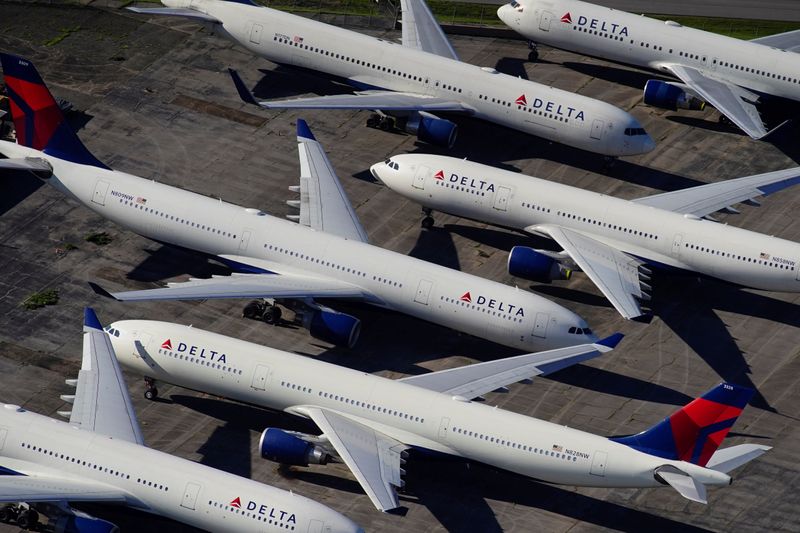By Tracy Rucinski
(Reuters) - Delta Air Lines Inc (N:DAL) has taken steps to halve its cash burn to $50 million per day through June after posting its first quarterly loss in eight years, and is bracing for a two to three year recovery from the coronavirus pandemic."We should be prepared for a choppy, sluggish recovery even after the virus is contained," Chief Executive Ed Bastian said in an employee memo on Wednesday.
A second wave of the coronavirus is expected to hit the United States next winter and could strike much harder than the first because it would likely arrive at the start of influenza season, the director of the Centers for Disease Control and Prevention warned on Tuesday.
Delta shares opened 3.6% higher but slipped into negative territory by late morning.
In a matter of months, U.S. airlines like Delta have gone from expansion to survival, searching for ways to raise and save as much cash as possible as flight cancellations started outnumbering new bookings around mid-March when Delta said demand dropped to near-zero.
By the end of the quarter, passenger volumes had dropped by as much as 95 percent and Delta was burning $100 million per day. Net sales are expected to remain slightly negative through June, said Chief Financial Officer Paul Jacobson, who has suspended his retirement to help the airline through the crisis.
After a series of cost-cutting measures and capital raisings, including a government bailout, the airline's daily cash burn will slow to about $50 million by the end of June, and possibly by May, executives said.
The airline expects to have $10 billion in liquidity in June, up from $6 billion in March.
Atlanta-based Delta said its expenses will decline by about 50%, or $5 billion, in the second quarter, and its revenues by 90%.
The airline swung to a $534 million net loss in the first quarter that ended March 31, or a $0.84 loss per share, from a $730 million net profit a year earlier.
Total operating revenues fell 18% to $8.59 billion.
Delta, the first U.S. airline to post first-quarter results, is among those receiving a government bailout meant to cover six months of payroll on the condition that it not lay off employees until October and retain a certain number of flights.
It received half of its $5.4 billion payroll aid on Monday; the remainder will arrive over April, May and June.
The airline also said it was considering applying for an additional $4.6 billion in secured government loans under the stimulus package known as the CARES Act.
Airlines could benefit in the coming quarter from a recent plunge in oil prices, though with so few planes flying the impact may not be substantial.
Between April and June, Delta is reducing its flight schedule by about 85%, including an 80% cut for domestic flights and 90% for international flights, which experts expect will be the slowest to recover. More than 37,000 employees have volunteered for unpaid leaves ranging from one month to one year in duration.
Delta's fuel expenses decreased 19% in the first quarter compared with a year earlier. It paid $1.81 per gallon, including a $29 million benefit from its refinery.
Delta is parking more than 650 aircraft in the midst of the crisis. Some of those jets may never fly again as the airline looks to downsize in the near term.

"This certainly isn’t the world we were expecting when the year began," Bastian said.